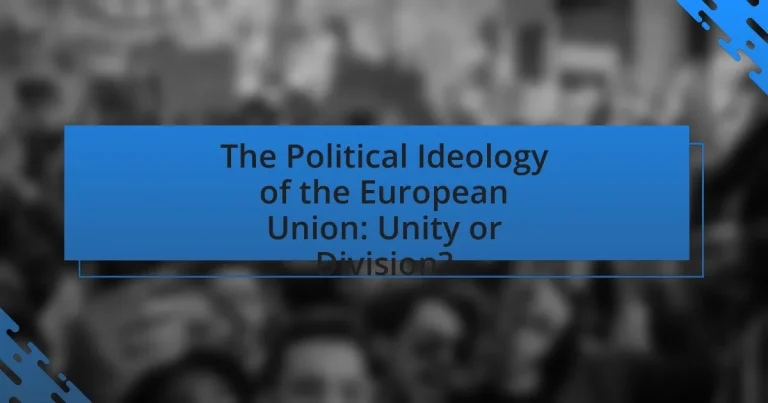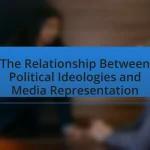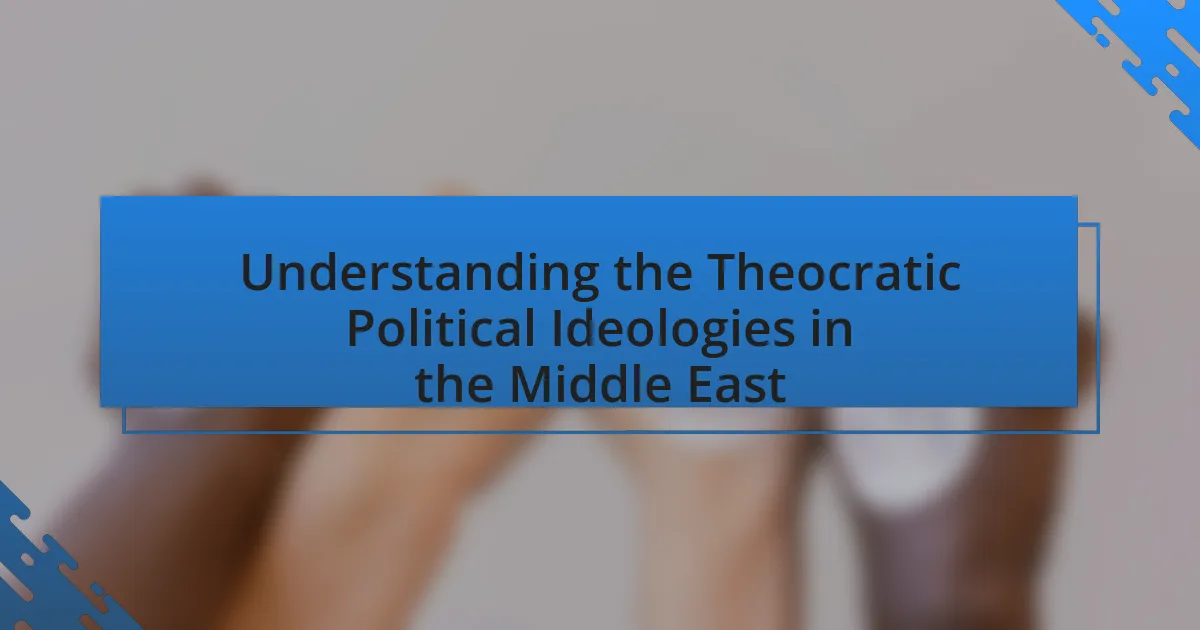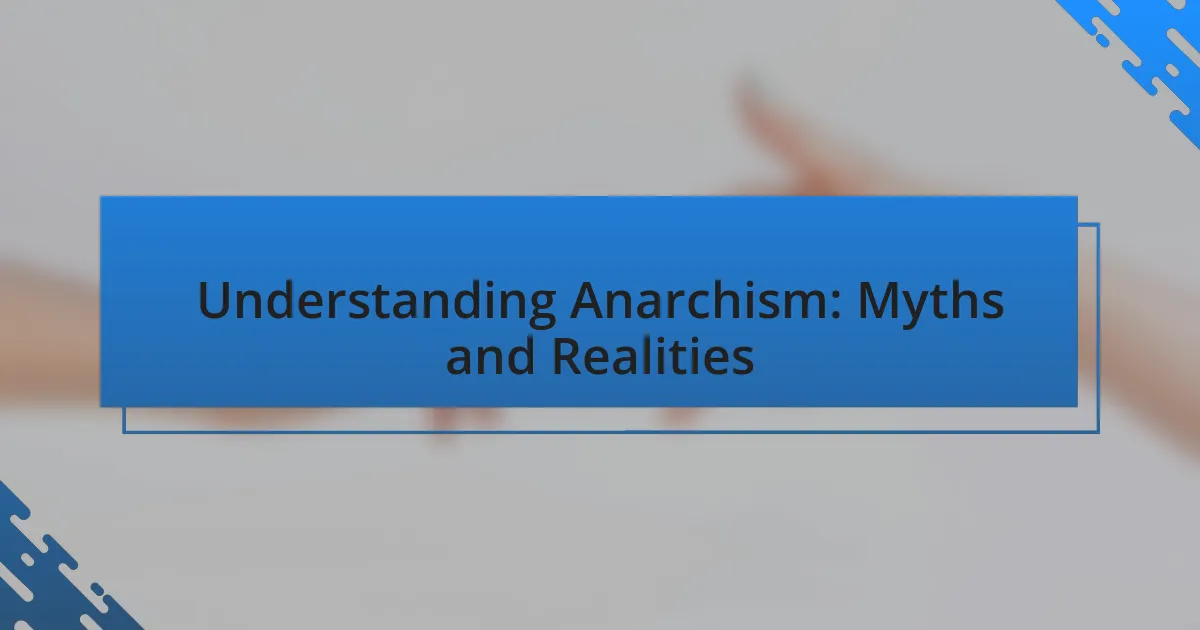The article examines the political ideology of the European Union (EU), focusing on its foundational principles of liberalism, democracy, human rights, and the rule of law. It explores how the concept of unity is manifested through collective decision-making and economic integration among member states, while also addressing historical events that have shaped this pursuit of unity. The article highlights the contributions and challenges posed by member states, the significance of democracy and human rights within the EU’s framework, and the impact of economic disparities and rising nationalism on cohesion. Additionally, it discusses the implications of Brexit and offers strategies for strengthening the EU’s political ideology through enhanced citizen engagement and education.
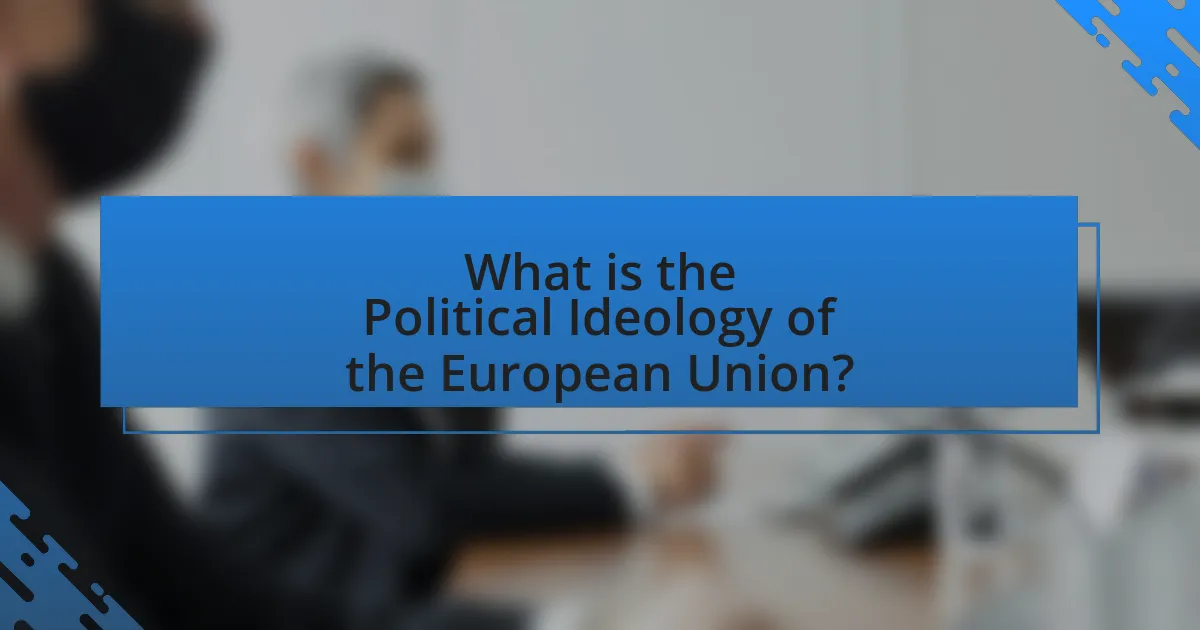
What is the Political Ideology of the European Union?
The political ideology of the European Union is primarily based on principles of liberalism, promoting democracy, human rights, and the rule of law. This ideology is reflected in the EU’s foundational treaties, such as the Treaty on European Union, which emphasizes the importance of upholding democratic values and ensuring the protection of individual rights among member states. Additionally, the EU advocates for economic integration and social cohesion, aiming to create a unified market that fosters cooperation and stability across Europe.
How does the concept of unity manifest within the EU’s political ideology?
The concept of unity manifests within the EU’s political ideology through the promotion of collective decision-making, shared values, and economic integration among member states. This is evident in the establishment of common policies, such as the Single Market, which facilitates free movement of goods, services, capital, and people, thereby reinforcing interdependence. Additionally, the EU’s commitment to fundamental rights and democratic principles, as outlined in the Charter of Fundamental Rights of the European Union, underscores a unified approach to governance and social cohesion. The EU’s response to crises, such as the COVID-19 pandemic, further illustrates unity through coordinated health measures and financial support mechanisms like the NextGenerationEU recovery plan, which aims to ensure solidarity among member states.
What historical events have shaped the EU’s pursuit of unity?
The historical events that have shaped the EU’s pursuit of unity include the aftermath of World War II, the establishment of the European Coal and Steel Community in 1951, the signing of the Treaty of Rome in 1957, the Maastricht Treaty in 1992, and the expansion of the EU to include Eastern European countries after the Cold War. The devastation of World War II highlighted the need for cooperation to prevent future conflicts, leading to the formation of initial economic partnerships. The European Coal and Steel Community aimed to integrate key industries among member states, fostering economic interdependence. The Treaty of Rome established the European Economic Community, promoting free trade and economic collaboration. The Maastricht Treaty introduced the concept of European citizenship and laid the groundwork for the euro, further deepening integration. Finally, the post-Cold War expansion reflected a commitment to unifying Europe and promoting stability in the region. These events collectively illustrate the EU’s ongoing efforts to achieve political and economic unity among its member states.
How do member states contribute to or challenge this unity?
Member states contribute to the unity of the European Union by aligning their policies and regulations with EU standards, fostering economic cooperation, and participating in collective decision-making processes. For instance, the implementation of the Single Market allows member states to benefit from free movement of goods, services, capital, and people, which enhances economic integration and unity. Conversely, member states challenge this unity through nationalistic policies, resistance to EU regulations, and divergent political agendas. An example is the rise of Euroscepticism in countries like the United Kingdom, which led to Brexit, illustrating how a member state can disrupt the cohesion of the EU by prioritizing national interests over collective goals.
What are the key principles underlying the EU’s political ideology?
The key principles underlying the EU’s political ideology are integration, democracy, rule of law, and respect for human rights. Integration emphasizes the unification of member states to promote peace and stability, as seen in the establishment of the European Single Market, which facilitates free movement of goods, services, capital, and people. Democracy is reflected in the EU’s commitment to democratic governance, ensuring that decisions are made transparently and with citizen participation, exemplified by the directly elected European Parliament. The rule of law is fundamental, ensuring that all actions taken by the EU are based on established laws, which is crucial for maintaining order and justice within the union. Lastly, respect for human rights is enshrined in the Charter of Fundamental Rights of the European Union, which protects individual freedoms and promotes social justice across member states. These principles collectively guide the EU’s policies and actions, reinforcing its identity as a political entity focused on unity and cooperation among diverse nations.
How does democracy play a role in the EU’s political framework?
Democracy is fundamental to the EU’s political framework as it ensures that citizens have a voice in decision-making processes. The European Union operates on principles of representative democracy, where the European Parliament, directly elected by EU citizens, plays a crucial role in shaping legislation and policy. This democratic structure is reinforced by the requirement for member states to uphold democratic values, as outlined in Article 2 of the Treaty on European Union, which emphasizes respect for human rights, freedom, and the rule of law. Additionally, the EU promotes democratic governance through initiatives like the European Citizens’ Initiative, allowing citizens to propose legislation, thereby enhancing participatory democracy within the Union.
What is the significance of human rights in the EU’s ideology?
Human rights are central to the European Union’s ideology, serving as a foundational principle that promotes dignity, freedom, and equality among its member states. The EU’s commitment to human rights is enshrined in key documents such as the Charter of Fundamental Rights of the European Union, which outlines the rights and freedoms guaranteed to all individuals within its jurisdiction. This emphasis on human rights fosters unity among member states by establishing common values and standards, thereby reinforcing the EU’s identity as a community built on democratic principles and the rule of law. Furthermore, the EU actively promotes human rights both internally and externally, influencing its foreign policy and relationships with non-member countries, which underscores the significance of human rights in shaping the EU’s political landscape and its role on the global stage.
In what ways does the EU experience division among its member states?
The European Union experiences division among its member states primarily through differing national interests, economic disparities, and varying political ideologies. For instance, countries in Northern Europe, such as Germany and the Netherlands, often prioritize fiscal discipline and economic stability, while Southern European nations like Greece and Italy may advocate for more flexible economic policies to address high unemployment and debt levels. Additionally, issues such as migration policy have led to significant rifts, with Eastern European countries resisting mandatory refugee quotas, contrasting with the positions of Western European nations that support more inclusive policies. These divisions are further exacerbated by the rise of populist movements in several member states, which challenge the EU’s collective decision-making processes and promote national sovereignty over EU integration.
What factors contribute to political division within the EU?
Political division within the EU is primarily influenced by differing national interests, economic disparities, and varying political ideologies among member states. National interests often clash, as countries prioritize their own economic and political agendas over collective EU goals, leading to tensions on issues like migration and fiscal policy. Economic disparities, particularly between wealthier northern states and economically challenged southern states, exacerbate these divisions, as seen during the Eurozone crisis when countries like Greece faced severe austerity measures imposed by more affluent nations. Additionally, the rise of populist and nationalist movements across Europe has introduced divergent political ideologies, challenging the EU’s foundational principles of integration and solidarity, which has been evident in the Brexit referendum and the increasing support for anti-EU parties in several member states.
How do economic disparities affect unity and division in the EU?
Economic disparities significantly affect unity and division in the EU by creating tensions between member states with varying levels of wealth and economic stability. For instance, countries in Southern Europe, such as Greece and Spain, often face higher unemployment rates and lower GDP per capita compared to wealthier Northern European nations like Germany and the Netherlands. This economic imbalance can lead to feelings of resentment and division, as wealthier nations may resist financial support measures, while poorer nations may feel marginalized and unsupported. Additionally, the European Central Bank’s monetary policies, which are often more favorable to stronger economies, can exacerbate these disparities, further straining relationships among member states. The ongoing debates over fiscal transfers and economic governance illustrate how these disparities can hinder collective decision-making and foster division within the EU.
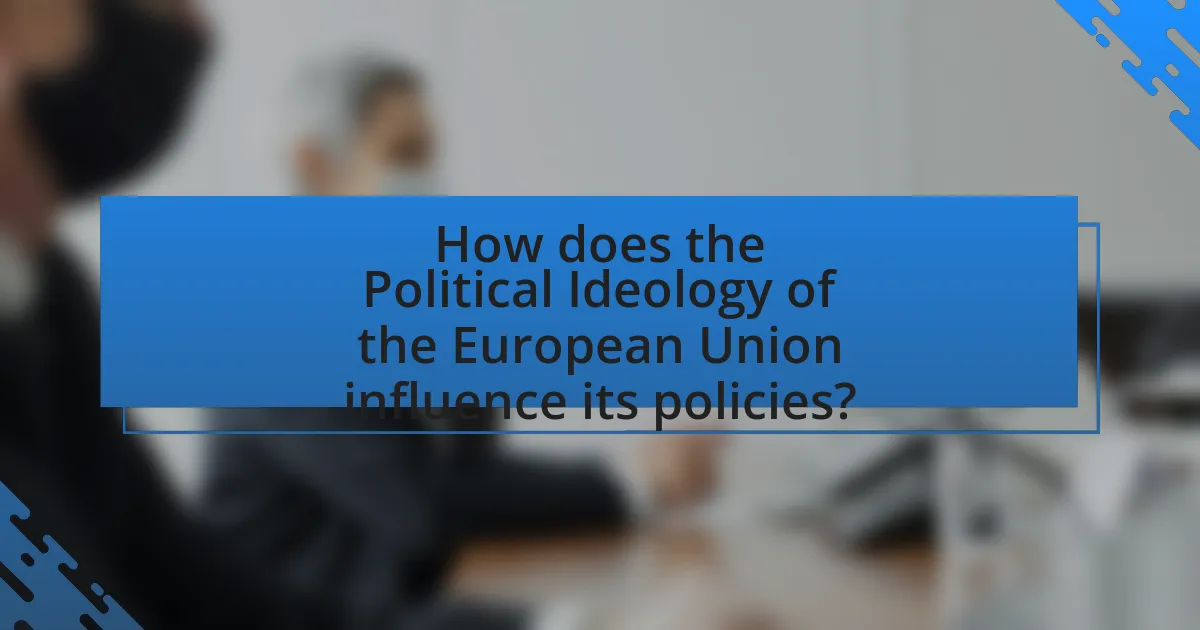
How does the Political Ideology of the European Union influence its policies?
The political ideology of the European Union significantly influences its policies by promoting principles such as democracy, human rights, and the rule of law. This ideological framework shapes legislative actions, regulatory standards, and international relations, ensuring that member states adhere to shared values. For instance, the EU’s commitment to human rights is evident in its Charter of Fundamental Rights, which mandates that all policies respect individual freedoms and equality. Additionally, the EU’s emphasis on economic integration and social cohesion is reflected in policies like the Common Agricultural Policy and the Cohesion Fund, aimed at reducing disparities among regions. These policies are rooted in the EU’s ideological goal of fostering unity and stability among its diverse member states.
What role does the EU’s ideology play in shaping its foreign policy?
The EU’s ideology significantly influences its foreign policy by promoting values such as democracy, human rights, and the rule of law. This ideological framework guides the EU’s diplomatic relations and policy decisions, often prioritizing partnerships with countries that share these values. For instance, the EU’s enlargement policy has historically favored the integration of Eastern European nations that demonstrate a commitment to democratic reforms, as seen in the accession of countries like Poland and Hungary. Additionally, the EU employs conditionality in its foreign aid, linking support to adherence to human rights standards, which reflects its ideological stance. This approach not only shapes the EU’s external actions but also reinforces its identity as a normative power on the global stage.
How does the EU approach international relations based on its ideological stance?
The European Union approaches international relations through a framework of multilateralism, promoting cooperation, democracy, and human rights. This ideological stance is rooted in the EU’s foundational principles, which emphasize collective action and shared values among member states. The EU actively engages in diplomatic efforts, exemplified by its role in international organizations such as the United Nations and its participation in global agreements like the Paris Agreement on climate change. Additionally, the EU’s commitment to development aid and conflict resolution reflects its ideological emphasis on stability and prosperity, aiming to foster peaceful relations with neighboring countries and beyond.
What are the implications of the EU’s ideology on trade agreements?
The implications of the EU’s ideology on trade agreements include a strong emphasis on multilateralism, sustainability, and human rights. The EU prioritizes trade agreements that reflect its values, such as environmental protection and social standards, which can lead to more stringent regulations compared to other trade blocs. For instance, the EU’s trade agreements often incorporate clauses that promote labor rights and environmental sustainability, as seen in the EU-Canada Comprehensive Economic and Trade Agreement (CETA), which includes commitments to uphold labor rights and environmental standards. This ideological framework can create both opportunities for enhanced cooperation and challenges, as it may lead to tensions with countries that do not share the same values or regulatory approaches.
How does the EU’s political ideology impact social policies among member states?
The EU’s political ideology, which emphasizes principles such as democracy, human rights, and social justice, significantly influences social policies among member states by promoting a framework for cooperation and standardization. This ideological foundation encourages member states to align their social policies with EU directives, such as the Charter of Fundamental Rights, which mandates protections for workers, equality, and social inclusion. For instance, the European Pillar of Social Rights, adopted in 2017, sets out key principles and rights to support fair working conditions and social protection, thereby guiding national policies towards greater social cohesion and reducing disparities among member states.
What are the common social policies influenced by the EU’s ideology?
The common social policies influenced by the EU’s ideology include social inclusion, gender equality, and workers’ rights. The EU promotes social inclusion through initiatives aimed at reducing poverty and discrimination, as evidenced by the European Social Fund, which allocates resources to support disadvantaged groups. Gender equality is reinforced by directives such as the Gender Equality Directive, which mandates equal pay and opportunities in the workplace. Additionally, the EU’s commitment to workers’ rights is reflected in the European Pillar of Social Rights, which outlines principles for fair working conditions and social protection. These policies collectively demonstrate the EU’s ideological focus on promoting social cohesion and equality among its member states.
How do member states balance national interests with EU social policies?
Member states balance national interests with EU social policies through negotiation and compromise, ensuring that both local priorities and EU regulations are addressed. For instance, countries often engage in discussions during EU Council meetings to align their social policies with EU directives while advocating for their specific national needs. This balancing act is evident in areas such as labor laws and social welfare, where member states may adopt EU frameworks but retain flexibility to implement policies that reflect their unique socio-economic contexts. The European Commission also plays a role by providing guidelines that encourage member states to harmonize their policies without undermining national sovereignty, thus fostering cooperation while respecting individual state interests.
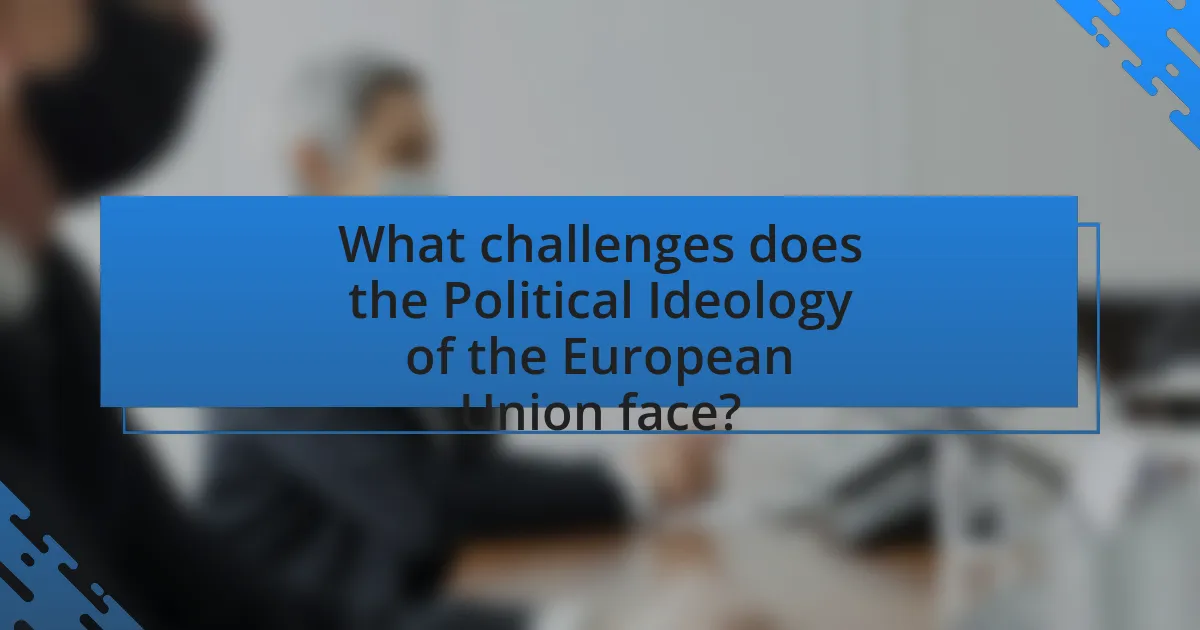
What challenges does the Political Ideology of the European Union face?
The Political Ideology of the European Union faces significant challenges, including rising nationalism, economic disparities among member states, and differing political values. Nationalism has surged in various EU countries, leading to calls for sovereignty over collective EU policies, which undermines the unity that the EU aims to promote. Economic disparities, highlighted by the varying levels of wealth and development across member states, create tensions regarding fiscal policies and resource allocation. Additionally, differing political values, particularly concerning issues like immigration and human rights, complicate consensus-building among member states, as seen in the debates surrounding the EU’s response to the refugee crisis. These challenges collectively threaten the cohesion and ideological foundation of the European Union.
How do populism and nationalism threaten the EU’s ideological unity?
Populism and nationalism threaten the EU’s ideological unity by promoting divisive narratives that prioritize national interests over collective European values. These movements often challenge the principles of solidarity and cooperation that underpin the EU, leading to increased polarization among member states. For instance, the rise of populist parties in countries like Hungary and Poland has resulted in policies that contradict EU norms on democracy and human rights, undermining the cohesion necessary for a unified European identity. Additionally, nationalist rhetoric can foster xenophobia and anti-immigrant sentiments, further fracturing the shared ideals of inclusivity and mutual respect that the EU aims to uphold.
What are the recent trends in populism within EU member states?
Recent trends in populism within EU member states indicate a rise in nationalist and anti-establishment sentiments, particularly in countries like Hungary, Poland, and Italy. These trends are characterized by the increasing electoral success of populist parties that advocate for stricter immigration controls, skepticism towards the EU, and a focus on national sovereignty. For instance, Hungary’s Fidesz party and Poland’s Law and Justice party have gained significant support by promoting policies that challenge EU norms and emphasize national identity. Additionally, Italy’s League party has capitalized on public discontent regarding immigration and economic issues, reflecting a broader shift towards populist rhetoric across the region.
How do nationalist movements impact EU policies and cohesion?
Nationalist movements significantly impact EU policies and cohesion by challenging the principles of integration and solidarity among member states. These movements often advocate for sovereignty and prioritize national interests over collective EU goals, leading to tensions in policy-making. For instance, the rise of nationalist parties in countries like Hungary and Poland has resulted in conflicts with EU regulations regarding rule of law and democratic standards, undermining the EU’s cohesion. Additionally, the Brexit referendum exemplified how nationalist sentiments can lead to the withdrawal of a member state, creating a precedent that may encourage similar movements in other countries, further fracturing EU unity.
What are the implications of Brexit on the EU’s political ideology?
Brexit has significant implications for the EU’s political ideology, primarily highlighting a shift towards nationalism and skepticism of supranational governance. The departure of the United Kingdom from the EU has emboldened nationalist movements within member states, as evidenced by the rise of parties advocating for sovereignty and reduced EU influence, such as France’s National Rally and Italy’s League. This trend challenges the EU’s foundational ideology of unity and integration, as member states increasingly prioritize national interests over collective European goals. Additionally, Brexit has prompted discussions about the future of EU cohesion, with some leaders advocating for deeper integration to prevent further exits, while others call for a re-evaluation of the EU’s role and powers. The contrasting responses to Brexit among member states illustrate a growing ideological divide, complicating the EU’s pursuit of a unified political identity.
How has Brexit influenced perceptions of unity within the EU?
Brexit has significantly influenced perceptions of unity within the EU by highlighting divisions among member states. The departure of the United Kingdom, a major economic and political player, raised concerns about the stability and cohesiveness of the EU. Following Brexit, surveys indicated that some EU citizens felt a stronger sense of belonging to the union, while others perceived increased fragmentation. For instance, a Eurobarometer survey conducted in 2020 showed that 60% of respondents believed that the EU should focus on strengthening unity in response to Brexit. This duality in perception underscores the complex impact of Brexit on the EU’s image as a united entity.
What lessons can the EU learn from the Brexit experience?
The EU can learn the importance of addressing member state concerns and fostering a sense of belonging to prevent discontent, as demonstrated by Brexit. The United Kingdom’s decision to leave the EU was largely influenced by feelings of alienation and dissatisfaction with EU governance, particularly regarding sovereignty and immigration policies. This highlights the necessity for the EU to engage more effectively with its citizens and member states to ensure their voices are heard and their needs are met, thereby reinforcing unity and mitigating the risk of further exits.
What strategies can the EU adopt to strengthen its political ideology?
The EU can strengthen its political ideology by promoting a unified narrative that emphasizes shared values such as democracy, human rights, and rule of law. This can be achieved through educational programs that foster a sense of European identity among citizens, highlighting the benefits of EU membership and cooperation. Additionally, the EU can enhance its political ideology by increasing transparency and citizen engagement in decision-making processes, thereby building trust and legitimacy. Evidence of the effectiveness of these strategies can be seen in initiatives like the European Citizens’ Initiative, which allows citizens to directly influence EU policy, demonstrating a commitment to participatory democracy.
How can the EU enhance communication and engagement with citizens?
The EU can enhance communication and engagement with citizens by implementing digital platforms that facilitate direct interaction and feedback. These platforms can include online forums, social media channels, and mobile applications designed to inform citizens about EU policies and initiatives while allowing them to voice their opinions. For instance, the European Commission has launched initiatives like the “EU Citizens’ Dialogue,” which directly engages citizens in discussions about EU matters, demonstrating a commitment to transparency and inclusivity. Additionally, utilizing data analytics can help tailor communication strategies to better meet the needs and preferences of diverse citizen groups, thereby fostering a more participatory democratic process.
What role does education play in promoting the EU’s ideological values?
Education plays a crucial role in promoting the EU’s ideological values by fostering a sense of European identity and citizenship among its citizens. Through educational programs and curricula that emphasize the principles of democracy, human rights, and cultural diversity, the EU aims to instill a shared understanding of its core values. For instance, initiatives like the Erasmus+ program facilitate cross-border educational exchanges, allowing students to experience different cultures and perspectives, thereby reinforcing the idea of unity within diversity. Additionally, educational institutions often incorporate EU-related content into their teaching, which helps to raise awareness about the EU’s functions and its significance in promoting peace and cooperation among member states. This approach is supported by the EU’s commitment to lifelong learning and the promotion of active citizenship, as outlined in the European Commission’s strategic framework for education and training.
